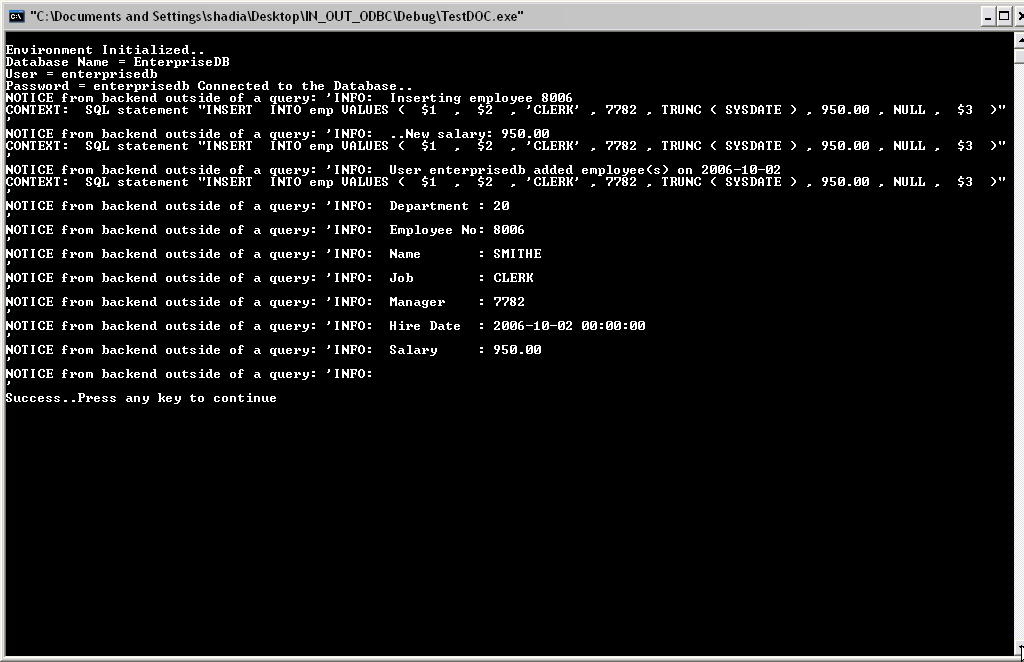 | Documentation |
|---|---|
26.5. Using IN, OUT, and IN OUT Parameter ModesEnterpriseDB provides support for IN, OUT, and IN OUT parameter modes in both stored procedures and functions. The following examples demonstrate the usage of the various parameter modes. Please note that the following examples are written in C and require a valid C/C++ compiler. The following examples demonstrate how a function and stored procedure with various parameter modes are called by a C program. 26.5.1. Example for Executing a FunctionThe sample SPL code for a function is shown below. CREATE OR REPLACE FUNCTION hire_clerk(
p_ename VARCHAR2,
p_deptno NUMBER
)
RETURN NUMBER
IS
v_empno NUMBER(4);
v_ename VARCHAR2(10);
v_job VARCHAR2(9);
v_mgr NUMBER(4);
v_hiredate DATE;
v_sal NUMBER(7,2);
v_comm NUMBER(7,2);
v_deptno NUMBER(2);
BEGIN
v_empno := new_empno;
INSERT INTO emp VALUES (v_empno, p_ename, 'CLERK', 7782,
TRUNC(SYSDATE), 950.00, NULL, p_deptno);
SELECT empno, ename, job, mgr, hiredate, sal, comm, deptno INTO
v_empno, v_ename, v_job, v_mgr, v_hiredate, v_sal, v_comm, v_deptno
FROM emp WHERE empno = v_empno;
DBMS_OUTPUT.PUT_LINE('Department : ' || v_deptno);
DBMS_OUTPUT.PUT_LINE('Employee No: ' || v_empno);
DBMS_OUTPUT.PUT_LINE('Name : ' || v_ename);
DBMS_OUTPUT.PUT_LINE('Job : ' || v_job);
DBMS_OUTPUT.PUT_LINE('Manager : ' || v_mgr);
DBMS_OUTPUT.PUT_LINE('Hire Date : ' || v_hiredate);
DBMS_OUTPUT.PUT_LINE('Salary : ' || v_sal);
DBMS_OUTPUT.PUT_LINE('Commission : ' || v_comm);
RETURN v_empno;
EXCEPTION
WHEN OTHERS THEN
DBMS_OUTPUT.PUT_LINE('The following is SQLERRM:');
DBMS_OUTPUT.PUT_LINE(SQLERRM);
DBMS_OUTPUT.PUT_LINE('The following is SQLCODE:');
DBMS_OUTPUT.PUT_LINE(SQLCODE);
RETURN -1;
END;The corresponding C code for executing this function is given below: BOOL ExecuteFunction()
{
RETCODE rCode;
HENV *hEnv = (HENV*)malloc(sizeof(HENV));
HDBC *hDBC = (HDBC*)malloc(sizeof(HDBC));
HSTMT *hStmt = (HSTMT*)malloc(sizeof(HSTMT));
SQLSMALLINT iTotCols = 0;
Connect("enterprisedb","enterprisedb","edb",&hEnv,&hDBC);
rCode = SQLAllocStmt(*hDBC,hStmt);
rCode = SQLAllocHandle(SQL_HANDLE_STMT,*hDBC,hStmt);
static SQLNUMERIC Num2=20;
static SQLNUMERIC Num3;
RETCODE rc=0;
SQLCHAR strName1[30] = "SMITHE";
SQLCHAR strName2[30];
static SQL_TIMESTAMP_STRUCT dt5;
SQLINTEGER Num1IndOrLen;
SQLINTEGER Num2IndOrLen;
rc = SQLPrepare((*hStmt),(SQLCHAR*)"{ ? = call hire_clerk(?,?)}",SQL_NTS);
rc = SQLBindParameter((*hStmt),1, SQL_PARAM_OUTPUT, SQL_C_ULONG,SQL_NUMERIC,0, 0,
&Num3, 0, &Num1IndOrLen);
rc = SQLBindParameter((*hStmt),2, SQL_PARAM_INPUT, SQL_C_CHAR, SQL_VARCHAR,30, 0,
strName1,30, &Num2IndOrLen);
rc = SQLBindParameter((*hStmt),3, SQL_PARAM_INPUT, SQL_C_ULONG,SQL_NUMERIC,0, 0,
&Num2, 0, &Num1IndOrLen);
Num1IndOrLen=0;
Num2IndOrLen=0;
rc = SQLExecute((*hStmt));
if(rc == SQL_SUCCESS || rc == SQL_SUCCESS_WITH_INFO)
{
printf("Success..");
}
rc=SQLFetch((*hStmt));
if(SQL_NO_DATA == rc)
{
printf("No Data...\r\n");
return 0;
}
free(hEnv);
free(hDBC);
free(hStmt);
return 0;
}26.5.2. ExplanationFirst, the environment, database and statement handles are created and initialized. After that a database connection is established and the function is executed via a Callable Statement after which each parameter is bound separately to the command to be executed. Finally, the statement is executed. The output is displayed on the screen below. Once the program finishes executing the function and displaying the results all memory consumed by various resources is deallocated. 26.5.4. Example for Executing a Stored ProcedureThe sample SPL code for a stored procedure is shown below: CREATE OR REPLACE PROCEDURE emp_query (
p_deptno IN NUMBER,
p_empno IN OUT NUMBER,
p_ename IN OUT VARCHAR2,
p_job OUT VARCHAR2,
p_hiredate OUT DATE,
p_sal OUT NUMBER
)
IS
BEGIN
SELECT empno, ename, job, hiredate, sal
INTO p_empno, p_ename, p_job, p_hiredate, p_sal
FROM emp
WHERE deptno = p_deptno
AND (empno = p_empno
OR ename = UPPER(p_ename));
END;The following is the C program for executing the above stored procedure:
BOOL ExecuteProcedure_1()
{
RETCODE rCode;
HENV *hEnv = (HENV*)malloc(sizeof(HENV));
HDBC *hDBC = (HDBC*)malloc(sizeof(HDBC));
HSTMT *hStmt = (HSTMT*)malloc(sizeof(HSTMT));
SQLSMALLINT iTotCols = 0;
Connect("enterprisedb","enterprisedb","edb",&hEnv,&hDBC);
rCode = SQLAllocStmt(*hDBC,hStmt);
rCode = SQLAllocHandle(SQL_HANDLE_STMT,*hDBC,hStmt);
static SQLREAL Num1=7369;
static SQLNUMERIC Num2=20;
static SQLREAL Num3;
RETCODE rc=0;
SQLCHAR strName1[30] = "SMITH";
SQLCHAR strName2[30];
static SQL_TIMESTAMP_STRUCT dt5;
SQLINTEGER Num1IndOrLen;
SQLINTEGER Num2IndOrLen;
SQLINTEGER Num3IndOrLen;
SQLINTEGER Num4IndOrLen;
SQLINTEGER Num5IndOrLen;
SQLINTEGER Num6IndOrLen;
rc = SQLPrepare((*hStmt),(SQLCHAR*)"{call emp_query(?,?,?,?,?,?)}",SQL_NTS);
rc = SQLBindParameter((*hStmt),1, SQL_PARAM_INPUT_OUTPUT, SQL_C_ULONG,SQL_NUMERIC,0, 0,
&Num2, 0, &Num2IndOrLen);
rc = SQLBindParameter((*hStmt),2, SQL_PARAM_INPUT, SQL_C_FLOAT,SQL_NUMERIC,0, 0,
&Num1, 0, &Num1IndOrLen);
rc = SQLBindParameter((*hStmt),3, SQL_PARAM_INPUT, SQL_C_CHAR, SQL_VARCHAR,30, 0,
strName1,30, &Num3IndOrLen);
rc = SQLBindParameter((*hStmt),4, SQL_PARAM_OUTPUT, SQL_C_CHAR, SQL_CHAR,31, 0,
strName2,31, &Num4IndOrLen);
rc = SQLBindParameter((*hStmt),5, SQL_PARAM_OUTPUT, SQL_C_TIMESTAMP, SQL_TIMESTAMP,0, 0,
&dt5,0, &Num5IndOrLen);
rc = SQLBindParameter((*hStmt),6, SQL_PARAM_OUTPUT, SQL_C_FLOAT,SQL_NUMERIC,0, 0,
&Num3, 0, &Num6IndOrLen);
Num1IndOrLen=0;
Num2IndOrLen=0;
Num3IndOrLen=0;
Num4IndOrLen=0;
Num5IndOrLen=0;
Num6IndOrLen=0;
rc = SQLExecute((*hStmt));
if(rc == SQL_SUCCESS || rc == SQL_SUCCESS_WITH_INFO)
{
printf("Job = %s\r\n",strName2);
printf("Hire Year = %d\r\n",dt5.year);
printf("Hire Month = %d\r\n",dt5.month);
printf("Hire Day= %d\r\n",dt5.day);
printf("Sal = %.0f\r\n",Num3);
}
rc=SQLFetch((*hStmt));
if(SQL_NO_DATA == rc)
{
printf("No Data...\r\n");
return 0;
}
free(hEnv);
free(hDBC);
free(hStmt);
return 0;
}26.5.5. ExplanationHere too, the environment, database and statement handles are first created and initialized. Once a database connection is established, the function is executed via a Callable Statement after which each parameter is bound separately to the command to be executed. Once the statement has been executed, all memory consumed by various resources is deallocated. |

